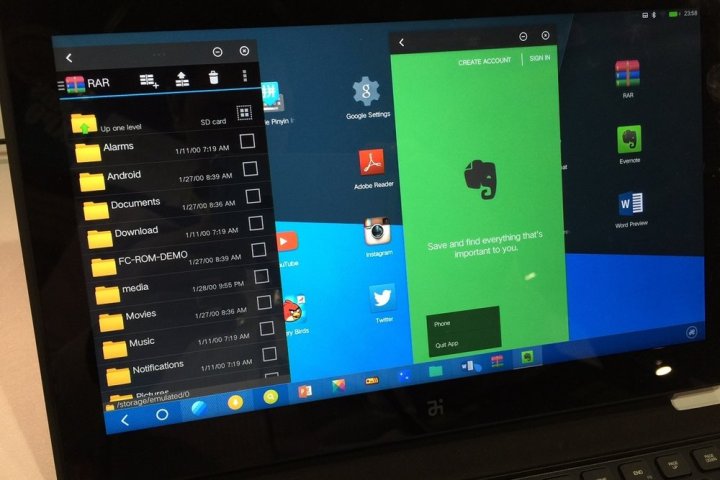
Beijing-based Jide Technology has spend the last three years developing a dual-mode operating system based on Android, Google’s mobile smartphone OS, called Remix OS. It’s capable of switching between a Windows-like desktop environment and an interface environment optimized for phones, and is effectively a smartphone’s default operating system.
Once the operating system has been installed and the smartphone’s been connected to an external monitor, Remix’s desktop environment launches. Installed Android apps feature floating menus, a start menu, and a task bar. Microsoft Word, Gmail, and even games like Asphalt become navigable with a keyboard and mouse.
“[It will be] as close to stock Android as possible,” Jide Technology CEO David Ko told The Verge. “But imagine when you get back to your office or study, you connect your phone and it turns into a PC mode, just like a laptop or desktop.

Ko envisions Remix replacing laptops, tablets, and even desktops in developing markets. He sees office workers using a phone as their primary device, bringing it home with them and connecting it to a monitor and keyboard.
“In the next five years, roughly 5 billion people will be coming online,” says Ko. “And when they come online, their No. 1 choice will be the smartphone; an affordable smartphone, and that will be an Android,” Ko told The Verge. “If your phone can replace [your PC], it’s a huge saving, and has a big impact to productivity.”
But as The Verge notes, multi-device setups are an unattractive proposition in countries where low-powered, budget handsets dominate. And then there’s the matter of setup.
Jide’s searching for a partner who’s willing sell phones that support Remix OS, but has yet to sign an interested party. And while the Remix will be eventually be made available for crafty users to download and install themselves, it lacks access to Android’s app market — the Google Play Store. Installing apps requires additional steps.
The road to an all-in-one smartphone is paved with failures. Ubuntu’s attempt, dubbed Convergence, never caught on in a meaningful way, and Asus’s PadFone range — a combination phone and tablet — suffered the same fate. Ko believes Remix OS’s free-to-download distribution method and access to the broader Android ecosystem will make it a success where others have failed.
“This is the culmination of the past three years’ of development,” says Zhend. “The freedom to not have to worry about carrying a laptop or tablet is a very powerful thing.”
